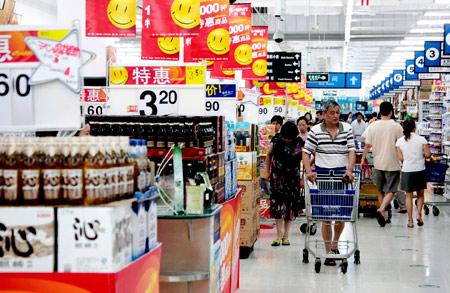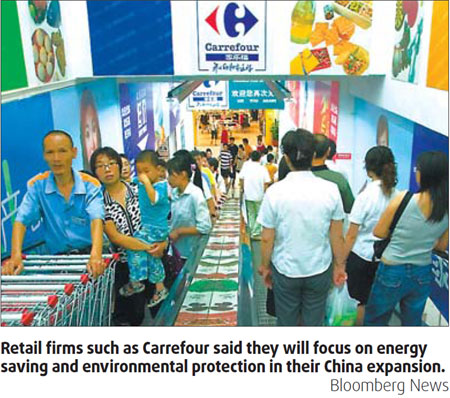
Customers shop in a Wal-Mart store in Shanghai. Foreign retail chains are leading the way in developing environmentally friendly stores in China, according to China Chain Store and Franchise Association. [CFP]
International retailers are leading their domestic peers in environmental protection and energy-saving campaigns, a recent report by the China Chain Store and Franchise Association (CCFA) stated.
French retail giant Carrefour Group invested more than 200 million yuan in renovation and reconstruction of existing stores last year to make them more energy efficient.
Existing outlets are expected to reduce energy consumption by 15 percent after renovation and reconstruction.
Its new stores under construction are all energy-saving outlets. The energy consumption at these outlets will be 20 percent lower than old ones, according to the company.
US-based retail giant Wal-Mart Stores Inc has said that compared to a typical store in 2005, its new outlets consume 23 percent less electricity and 17 percent less water annually.
The CCFA report showed that energy-saving efforts by Chinese retailers focus mainly on saving electricity on air conditioning, lights and refrigeration.
Since 2007, many Chinese retailers have started renovations at existing stores, and some have expanded energy-conservation efforts to office areas, distribution locations and logistics centers.
Energy-saving lighting
The Ministry of Commerce has promoted an Energy Conservation Campaign among retailers since 2007 to help them reduce energy costs by 20 percent by 2010.
A CCFA survey said that from 2007 until 2008, an average retail enterprise invested 500,000 yuan to 3 million yuan for renovations of a store for environmental and energy purposes.
But the bulk of enterprises invested less than 500,000 yuan per store, according to the survey.
The survey said that retailers usually need one to three years to recover their investment.
About 81 percent of polled retailers regarded adoption of energy-saving technologies as the most effective way to reduce their energy consumption.
And 41 percent thought energy-saving management is also crucial, according to the report.
Using the energy consumption of China's top 100 retail companies in 2008, the CCFA reports that their 120,000 outlets can save 1.7 billion kWh of electricity and 1.6 million tons of carbon dioxide annually when they realize the 20 to 30 percent of energy reduction in renovated stores.
Retail chains also can guide their customers' way of shopping and promote environmental friendly and recycling ideas, according to the report.
In the first year of China's plastic bag ban, retailers helped the country reduce the use of more than 40 billion plastic bags.
Source: China Daily

























